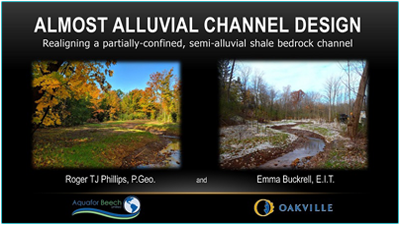TRACK 2
Almost Alluvial Channel Design: Realigning a Partially Confined, Semi-Alluvial Shale Bedrock Channel
ABSTRACT
Alluvial channel design can be used to restore streams where the riparian corridor is wide enough to allow for mobile bed materials and long-term channel migration
Unlike most natural channel design (NCD) practices fixated on stabilizing the channel, alluvial channel design retains the native alluvial materials to promote sustainable sediment dynamics with transport continuity between reaches.
While many NCD projects in urban areas require artificial stabilization to protect infrastructure — with implicit obligations for future maintenance — this presentation asks whether we are missing opportunities to implement alluvial channel designs.
Taplow Creek in the Town of Oakville was identified as a candidate for stream realignment and restoration using alluvial channel design to address erosion hazards within the valley corridor. The highest risks were to private properties along valley sides, where the channel was impinging on oversteepened slopes.
As a partially confined and semi-alluvial channel, Taplow Creek features boundary materials consisting of gravel and finer alluvial materials derived from local exposures of Queenston shale on the bed and banks.
This presentation will discuss:
- Alluvial channel design and its benefits
- The challenges and mitigation strategies for designing and constructing alluvial channels
- Strategies for identifying stream restoration opportunities where alluvial channel design would be of value over conventional NCD approaches
Learning Objectives
1. Gain an understanding of alluvial channel design and how it differs from conventional natural channel design practices
2. Consider the challenges and mitigation strategies for the design and construction of alluvial channels
3. Learn to identify opportunities and missed opportunities for alluvial channel design
ABOUT THE PRESENTERS

Roger Phillips
As a teacher, researcher, and geoscience consultant, Roger Phillips is an enthusiastic advocate for environmental geoscience and professional geomorphology. He has worked at Aquafor Beech since 2005.
Roger also teaches courses at the University of Toronto, and is an active member of APGO Council working on a number of committees, including Registration and Geomorphology.

Emma Buckrell
Emma Buckrell works in the geomorphology and water resources engineering division of Aquafor Beech, where she is involved in channel design projects, and conducts geomorphological and hydraulic assessments for watercourse and watershed studies.
Emma has a BASc in Environmental Engineering from the University of Waterloo and an MSc in Fluvial Geomorphology from the University of British Columbia.

